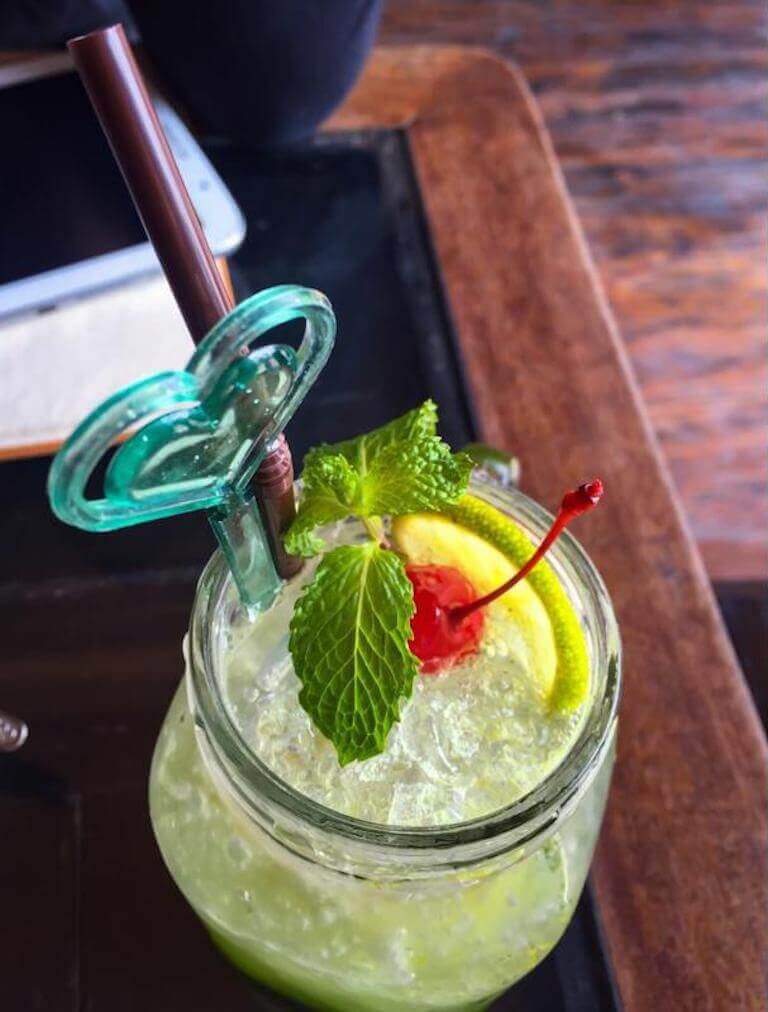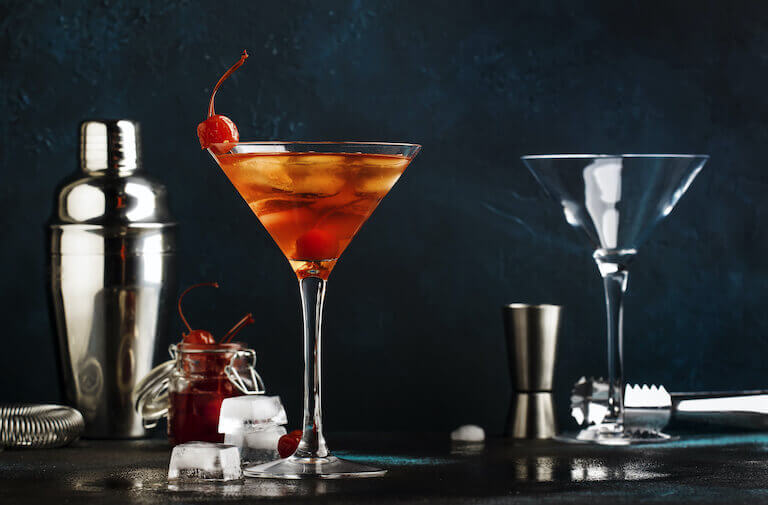Listen to This Article:
Taking a break from booze, but still want to enjoy a fun, flavorful drink? Consider making a “mocktail.”
Whether you’re cutting back, joining the sober curious movement, or just looking for a fun alternative, mocktails can be a great choice for any occasion. From a casual night in with friends to elegant social gatherings, mocktails provide the enjoyment of a well-crafted drink without the buzz. And as trends continue to move toward mindful drinking, restaurants, and bars are increasingly adding mocktail options to their menus, making it easier than ever to partake.
Get ready to explore what these non-alcoholic drinks are, why they’re growing in popularity, and some of the best mocktail recipes you won’t want to miss.
What Is a Mocktail? A Guide to This Alcohol-Free Drink
Mocktails are simply cocktails without the liquor. They use a wide range of ingredients that cover a spectrum of flavors, with many even mimicking the taste of bourbon, gin, vermouth, bitters, and other staples in the bartender’s kit.
Whether it’s for health reasons, a desire to cut back on alcohol, or simply a preference for a more sophisticated alcohol-free drink, mocktails can provide a flavorful alternative that doesn’t make you sacrifice the experience or taste while remaining sober. These crafted beverages can mimic traditional cocktails for those who want to enjoy the art of mixology without the alcohol.
What Is a Cocktail?
Cocktails are mixed drinks that consist of at least one spirit combined with mixers like tonic water, juice, flavored syrup, bitters, and other flavorings. Cocktails are often shaken with ice and served with garnishes such as olives, citrus wedges, salted rims, or fresh herbs.
Culturally, cocktails hold significance as symbols of elegance, sophistication, celebration, personal expression, and creativity. Cocktails and their historic importance in American life, are valued for far more than their taste or alcohol content.
Why Are More People Choosing Mocktails?
A cultural shift is taking place with Millennials and Gen Z driving the demand for non-alcoholic alternatives. Fueled by a growing awareness of the risks involved with alcohol, a push for healthier lifestyles, readily available alternatives, and evolving social norms, the younger generations are moving away from alcohol consumption.
In 2025, the U.S. Surgeon General released an advisory about the direct link between increased cancer risk and alcohol consumption. With access to more information like this, younger generations are increasingly prioritizing health and wellness, including mindful drinking.
Here are some recent trends from the NA beverage industry:
- U.S. non-alcoholic beverage consumption increased by 20% in 2023 and is projected to maintain a 17% compound annual growth rate (CAGR) through 2028.
- The “sober curious” movement has gained traction over the past several years, with Millennials and Gen Z accounting for two-thirds of NA beverage consumption.
- According to NIQ data, off-premise non-alcoholic beverage sales increased 30.93% to $740 million over 2024.
- “Alcohol adjacent” drinks are one of the fastest-growing niches in the NA space, with sales surging 54% from 2020 to 2024.
As non-alcoholic drinks continue to gain popularity, the focus has shifted toward creating sophisticated and flavorful mocktails that allow people a similar experience as traditional cocktails.

More people are choosing mocktails as they prioritize health, wellness, and mindful drinking, driving the rise of sophisticated alcohol-free alternatives.
The Art of Crafting a Mocktail
Crafting a mocktail isn’t easy – in fact, it can be nearly as complicated as making an excellently balanced alcoholic drink.
Bartenders and mixologists can create alcohol-free drinks using:
- Fresh-squeezed juices to add natural sweetness or acidity.
- Flavored syrups and bitters to replicate the depth found in alcoholic spirits.
- Tonics and carbonated waters for complexity and added texture.
- Botanicals and herbs to bring out subtle flavors.
Modern day mocktails are far from simple fruit punches and sodas. They are handcrafted beverages that cater to current trends and tastes. And these alcohol-free drinks only continue to rise in popularity as more people embrace mindful drinking.
Classic Mocktails: Timeless Alcohol-Free Drinks You Should Know
Some of the most well-known and longest-lasting mocktails are named for celebrities from the early and middle 20th century. While you might see these options on a menu, you may not know exactly what’s in each—or the stories behind their names.
These classic non-alcoholic alternatives have stood the test of time, remaining popular due to their simplicity and nostalgic charm. These mocktails are a great starting point for exploring the world of alcohol-free beverages.
Shirley Temple
A ginger ale, lemon-lime soda, lemonade, or other non-alcoholic base mixed with grenadine syrup and frequently garnished with a maraschino cherry. Named after the famous child actress.
Roy Rogers
A cola base, similarly mixed with grenadine syrup and garnished with a maraschino cherry. Named after the famous Western film actor and entertainer.
Arnold Palmer
A mix of iced tea and lemonade. The exact ratio and type of tea, whether sweetened or unsweetened, is open to interpretation and local tastes. Unlike the other two drinks, which simply bear the name of a popular celebrity, champion golfer Arnold Palmer was known to make this drink at home and order it at country clubs after finishing a round.
These three drinks can be seen as the forebearers of the modern mocktail, and many current day drinks are variations of these. However, most modern mocktails tend to be slightly less sweet than these original versions.
Modern Mocktail Recipes: Easy, Refreshing, and Sophisticated Options
Who says mixology requires alcohol? Building on the foundation of classic mocktails, these innovative, modern recipes take alcohol-free drinks to the next level. Whether you’re craving a refreshing beverage on a warm day or a bold and spicy specialty drink for a special occasion, these creative mocktails offer a fresh twist.
Pineapple Jalapeño Lime Mocktail
This creative concoction, shared by Orchids and Sweat Tea, marries heat, sweet, and citrus sour. It’s relatively simple to make and even includes directions for making citrus-jalapeño ice cubes. The drink blends mulled fruit juices and homemade lime simple syrup with ginger beer, sparkling water, or club soda.
Grapefruit-Ginger Kombucha Mocktail
Ginger has been a growing trend in the health and wellness space. This mocktail shared by Skinny Taste focuses on creating a healthy, fun, and refreshing alternative drink, and with three simple ingredients, it’s easy to make: ginger kombucha, grapefruit, and rosemary. You can easily tailor it to your personal preference by swapping the ginger kombucha flavor for a flavor of your choosing.
Mango Mule
Some mocktails draw close inspiration from existing alcoholic versions. The Moscow mule is a drink that includes ginger beer and vodka and is typically served in a copper mug. The Mango mule from Food & Wine uses ginger beer but swaps the vodka of the Moscow mule for honey syrup and mango puree, nectar, or juice, maintaining the sweetness without the alcohol. Served in that signature copper mug, it’s an excellent substitute for the established drink and stands well on its own, too.

Vibrant, handcrafted mocktails showcase the creativity and fresh ingredients that make alcohol-free drinks just as exciting as traditional cocktails.
Lemon-Lavender Mocktail
The lemon-lavender mocktail draws on lavender-infused simple syrup and lavender bitters, fresh lemon juice, and sparkling water to create a nuanced flavor. From essential oils to lattes, lavender is certainly trending, and All the Bitters has a quick recipe for the drink and syrup.
Virgin Mary
The Bloody Mary is perhaps the most beloved among brunch cocktails. This one is made without the vodka, but still packs a punch of sweet and savory flavors that offer a robust experience for everyone who drinks it. The Spruce suggests you simply use an existing Bloody Mary recipe and just leave out the booze.
Pina Colada Mocktail
If you’re a sucker for the tropical combination of pineapple and coconut but want to skip the rum, try this virgin version from Mary’s Whole Life. This creamy chilled drink is easy to throw together – the recipe requires just four ingredients blended together – and makes a refreshing option from beach to backyard.
Create Engaging Food and Beverage Experiences
The drinks that accompany a dish influence the overall flavor of a meal and the dining experience itself. Drinks are an especially important topic to consider when creating a restaurant menu or simply serving food to friends at a dinner party. While beer, wine, and cocktails can all complement a meal, non-alcoholic drinks are sometimes overlooked.
A culinary education is always a solid start for anyone looking to get crafty in a professional kitchen or behind the bar. Contact us to find out more.
WANT MORE RECIPES AND INSIGHTS ON TRENDS IN THE CULINARY INDUSTRY? TRY THESE ARTICLES:
- Defining Personal Wellness in the Food Industry
- 2025 Alcohol and Beverage Trends: Key Statistics on What’s Pouring in Bars and Homes
- Plant-Based vs. Vegan: Why Chefs Need to Know the Difference
This article was originally published on April 20, 2013, and has since been updated.
*Information may not reflect every student’s experience. Results and outcomes may be based on several factors, such as geographical region or previous experience.

